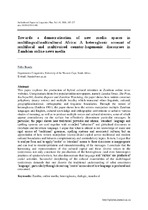| dc.contributor.author | Banda, Felix | |
| dc.date.accessioned | 2017-04-24T13:30:10Z | |
| dc.date.available | 2017-04-24T13:30:10Z | |
| dc.date.issued | 2016 | |
| dc.identifier.citation | Banda, F. (2016). Towards a democratisation of new media spaces in multilingual/multicultural Africa: A heteroglossic account of multilocal and multivoiced counter-hegemonic discourses in Zambian online news media. Stellenbosch Papers in Linguistics Plus, Vol. 49, 2016, 105-127 | en_US |
| dc.identifier.issn | 1726-541X | |
| dc.identifier.uri | http://hdl.handle.net/10566/2753 | |
| dc.identifier.uri | http://dx.doi.org/10.5842/49-0-686 | |
| dc.description.abstract | This paper explores the production of hybrid cultural identities in Zambian online news websites. Using extracts from five popular online newspapers, namely Lusaka Times, The Post, Kachepa360, Zambia Reports and Zambian Watchdog, the paper shows how writers construct polyphony (many voices) and multiple locality which transcend ethno-linguistic, cultural, geographical/national, orthographic and linguistic boundaries. Through the notion of heteroglossia (Bakhtin 1981), the paper shows how the writers manipulate multiple Zambian languages and English, cultural knowledge and orthographic conventions to achieve various shades of meaning; as well as to produce multiple voices and cultural identities, some of which appear contradictory on the surface but effectively disseminate particular messages. In particular, the paper shows how traditional proverbs and idioms, 'standard' language and spelling systems are used together with so-called "urbanised" and globalised discourses to (re)shape and (re)create language. I argue that what is critical is not knowledge of static and rigid norms of 'traditional' grammar, spelling systems and associated cultures, but an appreciation of how writers manipulate (trans)cultural capital across traditional and modern cultural boundaries and between complementary and contradictory logics. In turn, I argue that to analyse from and to apply 'centre' or 'standard' norms to these discourses is inappropriate and can lead to misinterpretation and misunderstanding of the messages. I conclude that the harnessing and representations of this cultural capital and these diverse voices in the (co)(n)texts not only constitute the peculiarities of the heteroglossic (and even heterotopic) practices of speakers/writers, but also demonstrate that language and 'culture' are products of social activities. Successful deciphering of the cultural materialities of the multilingual (co)(n)texts demands that one divorce the traditional understanding of what constitutes 'language', particularly through decentring 'centre' norms about how language is produced and consumed. | en_US |
| dc.language.iso | en | en_US |
| dc.publisher | University of Stellenbosch, Department of General Linguistics | en_US |
| dc.rights | This journal provides immediate open access to its content on the principle that making research freely available to the public supports a greater global exchange of knowledge. | |
| dc.subject | Zambia | en_US |
| dc.subject | Online media | en_US |
| dc.subject | Heteroglossia | en_US |
| dc.subject | Dialogic | en_US |
| dc.subject | Translocal | en_US |
| dc.title | Towards a democratisation of new media spaces in multilingual/multicultural Africa: A heteroglossic account of multilocal and multivoiced counter-hegemonic discourses in Zambian online news media | en_US |
| dc.type | Article | en_US |
| dc.privacy.showsubmitter | FALSE | |
| dc.status.ispeerreviewed | TRUE | |
| dc.description.accreditation | DHET | en_US |

